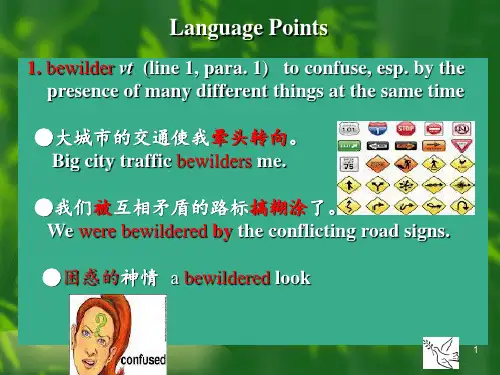研究生英语课件Unit769页PPT
- 格式:ppt
- 大小:273.00 KB
- 文档页数:69
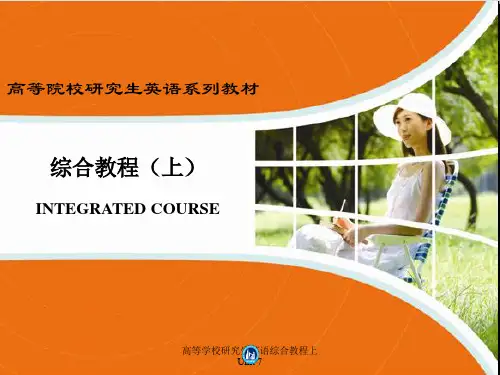
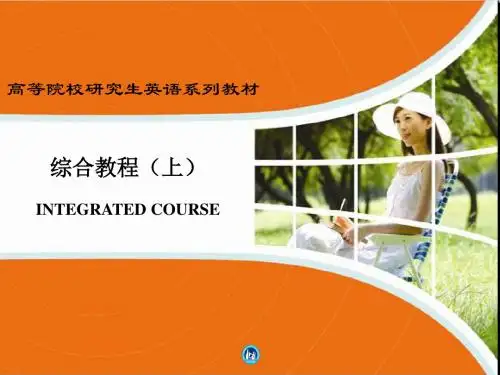
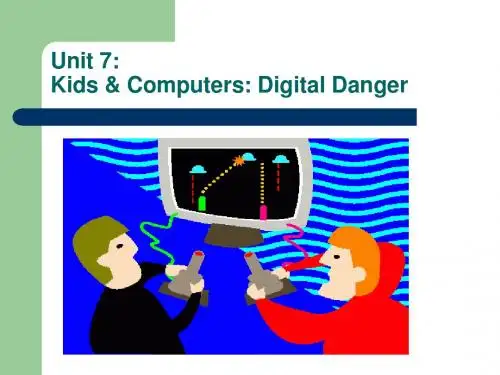
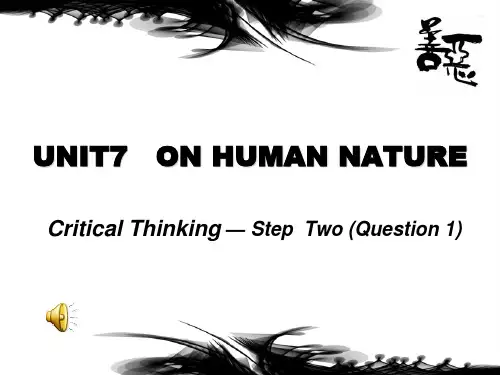
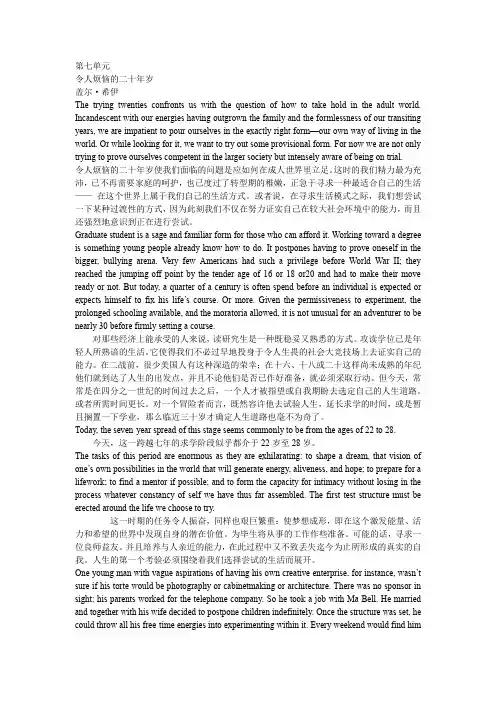
第七单元令人烦恼的二十年岁盖尔·希伊The trying twenties confronts us with the question of how to take hold in the adult world. Incandescent with our energies having outgrown the family and the formlessness of our transiting years, we are impatient to pour ourselves in the exactly right form—our own way of living in the world. Or while looking for it, we want to try out some provisional form. For now we are not only trying to prove ourselves competent in the larger society but intensely aware of being on trial.令人烦恼的二十年岁使我们面临的问题是应如何在成人世界里立足。
这时的我们精力最为充沛,已不再需要家庭的呵护,也已度过了转型期的稚嫩,正急于寻求一种最适合自己的生活——在这个世界上属于我们自己的生活方式。
或者说,在寻求生活模式之际,我们想尝试一下某种过渡性的方式,因为此刻我们不仅在努力证实自己在较大社会环境中的能力,而且还强烈地意识到正在进行尝试。
Graduate student is a sage and familiar form for those who can afford it. Working toward a degree is something young people already know how to do. It postpones having to prove oneself in the bigger, bullying arena. Very few Americans had such a privilege before World War II; they reached the jumping-off point by the tender age of 16 or 18 or20 and had to make their move ready or not. But today, a quarter of a century is often spend before an individual is expected or expects himself to fix his life’s course. Or more. Given the permissiveness to experiment, the prolonged schooling available, and the moratoria allowed, it is not unusual for an adventurer to be nearly 30 before firmly setting a course.对那些经济上能承受的人来说,读研究生是一种既稳妥又熟悉的方式。


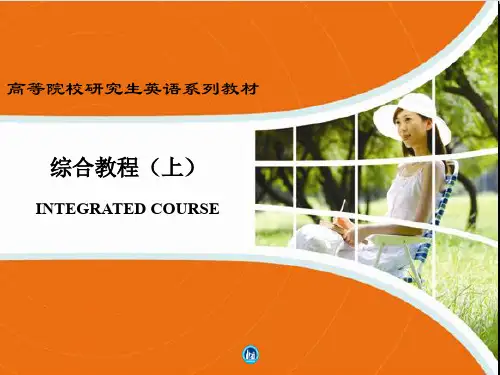
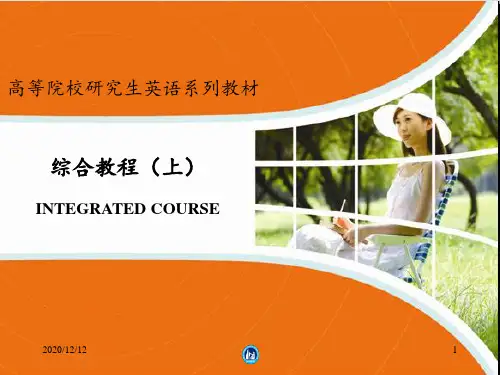
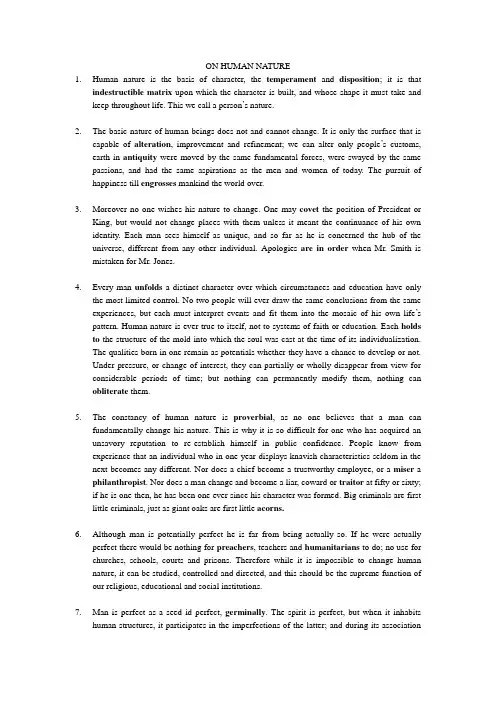
ON HUMAN NATURE1.Human nature is the basis of character, the temperament and disposition; it is thatindestructible matrix upon which the character is built, and whose shape it must take and keep throughout life. This we call a person’s nature.2.The basic nature of human beings does not and cannot change. It is only the surface that iscapable of alteration, improvement and refinement; we can alter only people’s customs, earth in antiquity were moved by the same fundamental forces, were swayed by the same passions, and had the same aspirations as the men and women of today. The pursuit of happiness till engrosses mankind the world over.3.Moreover no one wishes his nature to change. One may covet the position of President orKing, but would not change places with them unless it meant the continuance of his own identity. Each man sees himself as unique, and so far as he is concerned the hub of the universe, different from any other individual. Apologies are in order when Mr. Smith is mistaken for Mr. Jones.4.Every man unfolds a distinct character over which circumstances and education have onlythe most limited control. No two people will ever draw the same conclusions from the same experiences, but each must interpret events and fit them into the mosaic of his own life’s pattern. Human nature is ever true to itself, not to systems of faith or education. Each holds to the structure of the mold into which the soul was cast at the time of its individualization.The qualities born in one remain as potentials whether they have a chance to develop or not.Under pressure, or change of interest, they can partially or wholly disappear from view for considerable periods of time; but nothing can permanently modify them, nothing can obliterate them.5.The constancy of human nature is proverbial, as no one believes that a man canfundamentally change his nature. This is why it is so difficult for one who has acquired an unsavory reputation to re-establish himself in public confidence. People know from experience that an individual who in one year displays knavish characteristics seldom in the next becomes any different. Nor does a chief become a trustworthy employee, or a miser a philanthropist. Nor does a man change and become a liar, coward or traitor at fifty or sixty;if he is one then, he has been one ever since his character was formed. Big criminals are first little criminals, just as giant oaks are first little acorns.6.Although man is potentially perfect he is far from being actually so. If he were actuallyperfect there would be nothing for preachers, teachers and humanitarians to do; no use for churches, schools, courts and prisons. Therefore while it is impossible to change human nature, it can be studied, controlled and directed, and this should be the supreme function of our religious, educational and social institutions.7.Man is perfect as a seed id perfect, germinally. The spirit is perfect, but when it inhabitshuman structures, it participates in the imperfections of the latter; and during its associationwith matter takes on the mortal weaknesses, desires and limitations. But the spirit, the inner man, remains untouched and undefiled by evil. Only the outer man-the personality and the physical body-becomes imperfect, due to ignorance, wrong thinking and violation of the laws of being. The outer man, too, was originally perfect, but man has so desecrated and abused it that today it is a far cry from the original model.8.Man’s majesty and nobility are taken for granted, although his faults and weaknesses areconstantly paraded, before our eyes. Only when behavior deviates from the normal and faithful husband pass unnoticed. But the murderer, robber or wife beater is singled out for publicity, because such conduct is unusual.9.Man’s inherent goodness, moreover, is revealed by his countless acts of heroism,unselfishness and sacrifice. Daily one reads of men saving others at the peril of their own lives. One plunges into the surf and rescues a swimmer from drowning; another dashes into a burning house and carries a stranger to safety; others snatch a child from the wheels of death;many give their blood so that others may live. Countless unnamed and unrecorded men have given their lives for their fellowmen, not only on the battlefront but on the home-front as well.10.Human nature does not and cannot change buy unfolds its inherent pattern. Man has a natureand its laws can be known. We can only endeavor to understand man as he is.。
